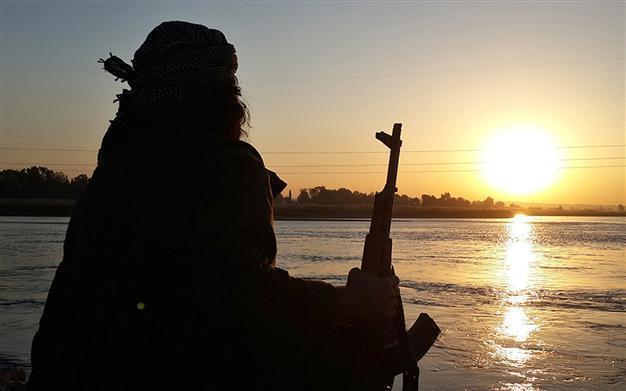ISIL militants use water as weapon in western Iraq
BAGHDAD - Reuters

In this photo released on Sept. 29, 2014 by a militant website, which has been verified and is consistent with other AP reporting, an ISIL fighter holds his AK-47 machine gun as he relaxes on the bank of the Euphrates river in Raqqa, Syria. AP Photo
Islamic State of Iraq and the Levant (ISIL) militants have closed gates of a dam on the Euphrates River in western Iraq, reducing the water and giving them greater freedom of movement to attack government forces downstream on the southern bank, local officials said.The militants have redirected the flow of water to their advantage on the battlefield around the city of Ramadi. But the tactic also threatens southern provinces with drought and the water has been reduced to worrying levels, the officials said.
The Euphrates has acted as a barrier between the militants who control its northern bank and pro-government forces who are are trying to advance towards Ramadi on the other side.
A spokesman for the governor of Anbar province, of which Ramadi is the capital, said security forces would now have to redeploy along the river to prevent the insurgents from infiltrating.
"Previously they had to monitor only the bridges and certain areas, but now all of the river will be crossable," Hikmat Suleiman said.
ISIL has previously sought to use water as a weapon in its war against the Iraqi government.
Last summer, the militants seized the Mosul dam in northern Iraq and threatened to submerge Baghdad until Kurdish forces drove them back with the help of airstrikes from an international coalition.
The Anbar provincial council met on June 3 to discuss how to respond. One member, Taha Abdul Ghani, suggested the government should bomb one of the dam's gates to release the water.
Residents of Ramadi and a local irrigation official said however the insurgents had left two of the dam's gates open, apparently to avoid flooding areas under their own control upstream.
The partial closure of the Ramadi dam has forced more water into a tributary running south to the Habbaniya lake, officials said.
Falih al-Essawi, a senior provincial security official, said the government had opened another dam to channel water from the Habbaniya Lake back into the Euphrates and prevent shortages in the southern provinces.
But he said this was only a temporary measure that would not be effective for more than three days.
"The government must act immediately otherwise dire consequences and an environmental catastrophe will be inevitable," he said.
















